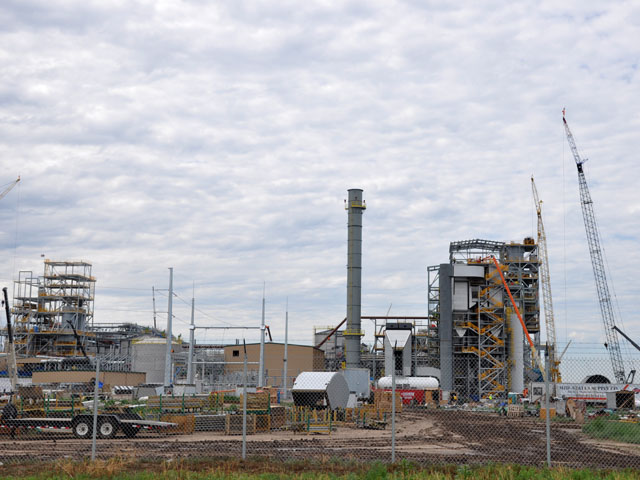Renewable Diesel to Launch in Hugoton
Seaboard Energy to Build Renewable Diesel Plant on Former Abengoa Cellulosic Site
LINCOLN, Neb. (DTN) -- A former cellulosic-ethanol plant in Hugoton, Kansas, will soon be home to a new renewable diesel plant after the facility once lauded as cutting edge in biofuels production changed ownership hands several times.
Seaboard Energy announced at the end of April plans to complete construction of a plant by Dec. 31, 2021, on the former Abengoa Bioenergy SA site in Hugoton.
Once complete, the plant will have the capacity to produce 85 million gallons of renewable diesel annually and 8.5 million gallons of renewable naphtha. Naphtha is a precursor to gasoline and other liquid fuels, solvents for paints, dry-cleaning, asphalts, rubber, and is used for industrial extraction processes. The plant also is expected to produce hydrogen.
The renewable fuels will be primarily derived from local animal fats and vegetable oils, according to a news release from Seaboard, a company based in Shawnee Mission, Kansas.
Seaboard expects to blend and ship biodiesel from the company's other biodiesel plants in Guymon, Oklahoma, and St. Joseph, Missouri, from the 800-acre site in Hugoton.
"Seaboard Energy plans to provide more than 60 jobs and has filled the 300 to 400 construction jobs with as many local residents as possible," the company said in a news release.
The launch of the Seaboard plant marks the end of what has been a long journey for the Hugoton community.
P[L1] D[0x0] M[300x250] OOP[F] ADUNIT[] T[]
To a lot of fanfare, Abengoa Bioenergy announced its official grand opening of what was touted as a state-of-the-art cellulosic ethanol plant in October 2014. The plant was one of a handful of plants considered to be the next generation of ethanol production, using crop residues such as corn stover and wheat straw and advanced feedstocks such as switchgrass.
In 2015, Abengoa Bioenergy ran into serious financial trouble and filed for bankruptcy protection from its creditors. At the time, Abengoa operated ethanol plants in Portales, New Mexico; Colwich, Kansas; Granite City and Mount Vernon, Illinois; and Ravenna and York, Nebraska.
Including the Hugoton biomass plant, Abengoa had a biofuel production capacity of more than 370 million gallons per year, making it one of the largest producers in the United States at the time.
In 2016, Shell Oil Company agreed to buy Abengoa Bioenergy's cellulosic ethanol plant in Hugoton, for what would have been a significantly discounted price of $26 million, according to court documents filed during a Chapter 11 bankruptcy. Shell was listed as the stalking-horse bidder, the first party to bid on the plant and set a floor price for auction.
Near the end of 2016, Synata Bio Inc. bought the plant at auction with a top bid of $48.5 million. Synata then sold the plant to High Plains Bioenergy in February 2019, which changed its name to Seaboard.
Seaboard Energy is a division of Seaboard Foods, which is a wholly owned subsidiary of Seaboard Corp.
Seaboard said in a news release the company has "recommissioned portions of the idle assets while simultaneously" building the renewable diesel facilities.
Seaboard Energy President and CEO Gary Louis said the Hugoton location will be a strategic advantage to the plant once completed.
"I am thrilled that Seaboard Energy can continue to further develop our business footprint in this area where we first started doing business over 26 years ago," he said in a statement.
"The facility location provides Seaboard Energy a strategic geographic advantage to capitalize on the integrated supply of inputs from area feedstock producers, Seaboard Foods' processing plant and Seaboard Foods' farms."
Read more DTN coverage here:
Todd Neeley can be reached at todd.neeley@dtn.com
Follow him on Twitter @toddneeleyDTN
(c) Copyright 2021 DTN, LLC. All rights reserved.




